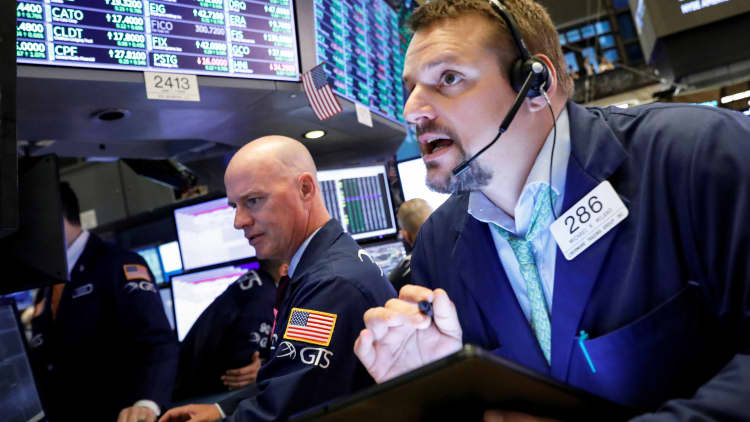
Stocks jumped to record highs on Thursday as tensions between Iran and the U.S. eased for the time being, with tech shares outperforming.
The Dow Jones Industrial Average closed 211.81 points higher, or 0.7% at 28,956.90, inching closer to 29,000. The S&P 500 climbed 0.7% to 3,274.70 while the Nasdaq Composite gained 0.8% to end at 9,203.43.
Apple shares jumped 2.1% to a record high after Chinese government data showed that iPhone sales rose 18% in December in the country. The S&P 500 tech sector rose 1.1%, led by a 2.4% gain in AMD shares. The chipmaker rose after an analyst at Mizuho Securities upgraded them to buy from neutral, citing a potentially stronger server market in 2020.
Goldman Sachs climbed 2.1% to boost the Dow after Bank of America upgraded the bank to buy from neutral, citing an attractive valuation and the benefits of a possible global economic rebound. Boeing, meanwhile, gained 1.5% after President Donald Trump said he doesn't believe a 737 crash in Iran was due to a mechanical error.
Tensions between Iran and the U.S. simmered down after Trump said Wednesday Iran appeared to be "standing down" after firing a barrage of missiles at military bases housing U.S. troops in Iraq.
"We do not want to be dismissive of the political ramification of recent events, but we doubt that they will have a long-lasting effect on the trajectory of markets unless matters develop well beyond where they stand today," said Michael Shaoul, chairman and CEO of Marketfield Asset Management, in a note.
The attack was in retaliation for the U.S. killing of Iranian Gen. Qasem Soleimani. Trump also suggested the U.S. would be open to negotiations with the Islamic Republic. "We must all work together toward making a deal with Iran that makes the world a safer and more peaceful place," Trump said.
Those remarks — coupled with the fact that no U.S. casualties were reported from the attack — soothed investor fears of further escalation between the two countries. They also quelled worries of a sharp jump in energy prices.
Crude prices settled below $60 per barrel on Thursday, well below their recent highs of more than $65 per barrel. The move towards safe haven assets such as gold and Treasurys has also reversed. Gold futures are trading off a near seven-year high while the 10-year Treasury yield was at 1.85%. Earlier in the week, the benchmark rate broke below 1.8%.
But while capital markets may be breathing a sigh of relief, Ladenburg Thalmann's Phil Blancato urged investors to remain cautious given how high valuations are right now.
"When you look at last year, you had record returns both the bond and equity market, but all of that was on multiple expansion," the firm's CEO said. "You had no earnings at all, yet you were up 31% on the S&P 500."
"Traditionally, you need earnings to generate returns in the stock market. If you don't have that, any minor ripple — positive or negative — is going to have a profound effect on the market," Blancato added.
Wall Street also digested strong employment data on Thursday, which helped lift sentiment. Weekly jobless claims fell by 9,000 to 214,000 from 223,000. That's better than the expected print of 220,000.
Thursday's jobless claims data follows stronger-than-expected private payroll numbers released Wednesday. ADP and Moody's Analytics said U.S. private payrolls increased by 202,000 in December, topping a Dow Jones estimate of 150,000.
Those numbers precede the Labor Department's release of its monthly jobs report on Friday. Economists polled by Dow Jones expect the U.S. economy added 160,000 jobs last month.
Investors were also optimistic about the signing of the the so-called phase one U.S.-China trade deal. The Chinese Commerce Ministry said overnight that Vice Premier Liu He will fly to Washington to sign the agreement, which was struck before year-end. Trump previously said the deal would be signed next Wednesday.
"There's a lot of optimism already priced in, but reading between the lines, it feels like a lot can still go wrong," said Erik Bregar, head of FX strategy at the Exchange Bank of Canada. "In the end, I think we're a long way from resolution on the big issues."
In corporate news, Kohl's shares dropped 6.5% after issuing earnings guidance to the low end of their fiscal 2019 forecast. Meanwhile, Bed Bath & Beyond pulled back more than 19% on news it is delaying the closure of 20 stores until fiscal 2020.
—CNBC's Sam Meredith contributed to this report.


